The Addition of the Pennsylvania Library of Foreign Literature and Science
Dana Dorman, Archivist, Library Company Papers Project
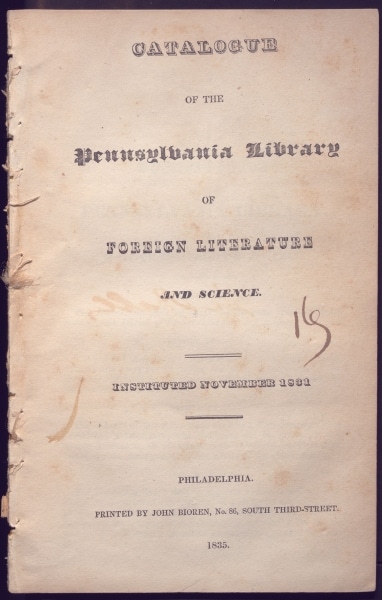
Image: Title page from Catalogue of the Pennsylvania Library of Foreign Literature and Science (Philadelphia: Printed by John Bioren, 1835).
In a previous blog post, I wrote about how three 18th-century libraries merged into the Library Company in 1769. But as I’ve been processing the library’s records from the mid-19th century, I have learned about a fourth library whose holdings – and shareholders – became part of the Library Company in 1840.
The Pennsylvania Library of Foreign Literature and Science was only nine years old when it was added to the Library Company. A notice in the Philadelphia Inquirer on November 28, 1831 had invited “subscribers to the proposals for the formation of a Public Library of Foreign Literature and Science” to meet at the American Philosophical Society’s hall on that date.
In that notice, the secretary of the new institution was listed as Frederick Fraley (1804-1901), a merchant, politician, and civic leader. Fraley was soon to be a Library Company shareholder as well: he acquired share #525 on May 11, 1832, and remained involved with the Library Company until his death more than six decades later.
Library Company shareholder William H. Keating (share #480) was also a shareholder and director in the new Foreign Library. Historian Jeffery R. Appelhans has noted that Keating’s notebooks now at the American Philosophical Society (Mss.B.K22) show that he even helped collect subscriptions to the Foreign Library, including one from former King of Spain Joseph Bonaparte!
By 1833, the new Foreign Library was based on S. 5th Street.
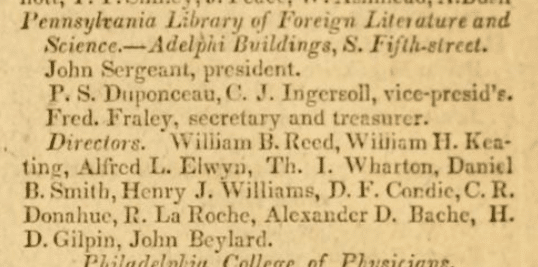
Image: Detail from Desilver’s Philadelphia and Stranger’s Guide for 1833 (Philadelphia: Robert Desilver, 1833). Courtesy of Internet Archive.
It published a catalog of its holdings in 1835, with titles of French, German, Italian, and Spanish literature.
But the library was apparently struggling by 1840, and reached out to the Library Company’s directors with a proposal.
According to the minutes from the Library Company’s directors meeting on April 2, 1840, members of that library “appointed to make a final disposition of the Library of Foreign Literature desire to know whether this Library Company is willing to give their members a share each for the books.”
The minutes note that the Foreign Library’s books had cost “about $2,500,” and it still owed more than $300 “which would be paid by an assessment on the members.”
About one month later, at the April 30, 1840 meeting, the Library Company’s committee on the subject reported that “they on behalf of this Institution accepted the offer of the Foreign Library Company & received a transfer of all its books, about 2,500 volumes.”
The terms dictated that the Library Company would pay $365 to the Foreign Library’s treasurer, and that the Library Company would issue a share to each of the Foreign Library’s 62 shareholders once they paid “their respective share of the sum of $363.50 advanced.”
In other words, the Foreign Library shareholders would each pay an assessment that would effectively pay off the library’s debt for the books AND earn them a share in the Library Company. The Library Company would gain approximately 2,500 more books and 62 new shareholders.
In the Library Company’s chronological share and directors register, the transaction is noted as “Library of Foreign Literature added (1840)”:

Image: Detail from list of 1840 directors in Chronological Share and Directors Register. Library Company of Philadelphia Records (MSS00270).
Each of the 62 new shareholders in that register are noted with “FL” next to their names, just like how the 1769 shareholders from the merger of the Union Library Company are listed with “Union” next to their names.
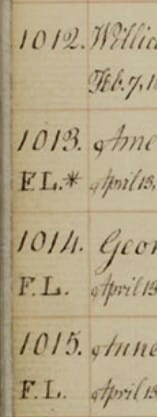
Image: Detail from list of shares in Chronological Share and Directors Register. Library Company of Philadelphia Records (MSS00270).
The first appearance of “F.L.” includes an asterisk and the following note:
“*The Persons to whose Names the Letters F.L. are prefixed were the Proprietors of the late Foreign Library, consisting of Two Thousand Five Hundred Volumes; and in consideration of the Transfer of all of the said Books to the Library Company of Philadelphia, they, respectively, became Members thereof, and each of their Names are here recorded as such. Their Number amounted to Sixty-two.”
The note was almost certainly written by board member and former librarian Zachariah Poulson (1761-1844), who handed off this register to his fellow directors just three years after the Foreign Library was “added” to the Library Company.
However, by 1856, the Library Company was describing the transaction simply as a purchase of books. Our 1856 catalog of holdings notes in the preface that the “well-selected books of the Library of Foreign Literature and Science, purchased in 1840, are included in the present volume.”
In fact, the Library Company printed bookplates for these volumes that specifically say “Purchased from the Pennsylvania Library of Foreign Literature.”
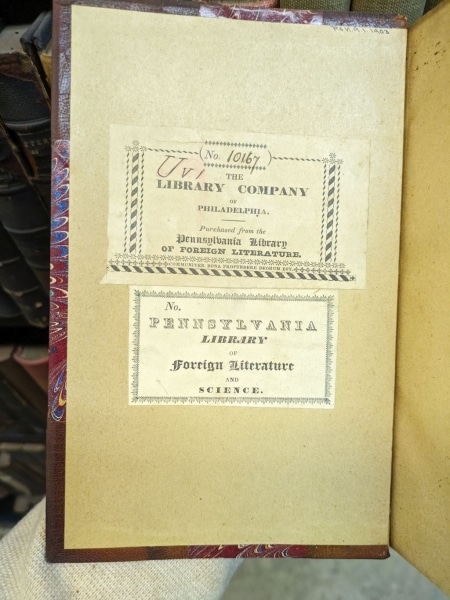
Image: Bookplates from both the Library Company of Philadelphia and the Pennsylvania Library of Foreign Literature and Science mark this copy of Mémoires de Mademoiselle Bertin Sur la Reine Marie-Antoinette, Avec Des Notes et des Éclaircissements (Paris: Bossange, 1824).
Unfortunately, I have found no other administrative records from the 1840s that shed additional light on our decision to “add” the Foreign Library, or to print these bookplates.
By 1900, our story had apparently shifted again.
Library Company Librarian James G. Barnwell (1835-1919) gave a talk about “Proprietary Libraries of Philadelphia” at a joint meeting of the Pennsylvania Library Club, New Jersey Library Association, and Library Association of Washington City, and he described it as a merger.
As quoted in The Library Journal from April 1900, he argued that “[f]our of the libraries mentioned have been merged in the Philadelphia Library – the Amicable, the Association, and the Union Library companies in 1769, and the Library of Foreign Literature and Science in 1840.”
Regardless of whether it was a merger or a purchase, many of the titles from the Library of Foreign Literature and Science remain part of the Library Company’s collections today.
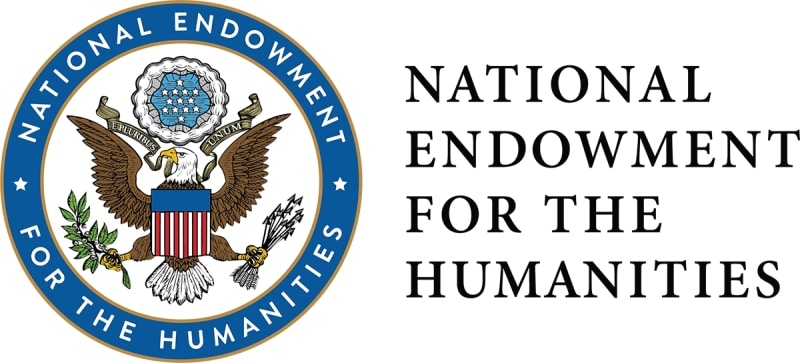
Any views, findings, conclusions, or recommendations expressed in this blog post do not necessarily represent those of the National Endowment for the Humanities.


